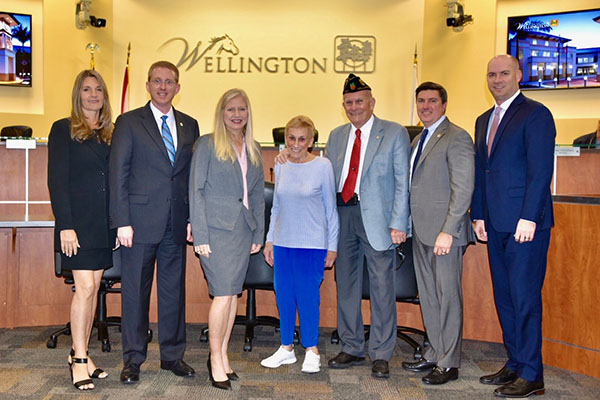
A bit of agenda re-ordering and some subterfuge was involved to get former Wellington Mayor Tom Wenham to come to the Wellington Village Council meeting on Tuesday, Feb. 25 thinking he had one good reason for attendance when he actually had two.
The first was a new way to honor Wellington veterans, and the second was the surprise addition of Wenham’s name to the Wellington Founder’s Plaque — an honor that has only been bestowed on eight others in the village’s history.
Councilman Michael Drahos told Wenham, who thought he was there to talk about an American Legion Post 390 program to honor Wellington veterans, that he hopes after his own term in government is over, his constituents will regard him as highly as the village regards the former mayor.
“I think a motion may be in order,” current Mayor Anne Gerwig said.
Drahos motioned that Wenham’s name be added to the Founder’s Plaque, which sits in the lobby of the Wellington Municipal Complex and is designed to honor people who were crucial in making Wellington the unique community it is today.
Vice Mayor Michael Napoleone quickly seconded the motion, and the council’s discussion period was used to offer praise to Wenham.
“We haven’t put anyone on it in seven years,” Councilman John McGovern said. “I see it as founders and sustainers, and it is incomplete without your name.”
Councilwoman Tanya Siskind agreed. “I won’t repeat all the great things that have been said in honor of our highly beloved former mayor,” she said.
“We are not founders,” said Gerwig, referring to the current council. “You are a founder,” she said to Wenham.
Prior to incorporation, Wenham sat on the Acme Improvement District Board of Supervisors, the village’s pre-incorporation government. He was elected to the inaugural Wellington Village Council in 1996 and became Wellington’s appointed mayor in 2000. When Wellington switched to an elected mayor, Wenham became the village’s first directly elected mayor in 2003. He served until 2008.
Wenham choked up as he looked for words. “Thank you,” he said, joined by his wife Regis. “I wasn’t prepared for this.”
He then talked about the program that American Legion Post 390 is doing in conjunction with the village where individual, personalized banners will honor veterans and be displayed on posts at busy thoroughfares. The program was the idea of Melanie Beatty, who saw a similar program done in a different community.
Additional information about applying to have a banner made for someone can be found on the American Legion Post 390 web site www.alpost390.com.
After Wenham’s presentation, the meeting stopped for photographs to be made and the crowd who had come for the presentation to disperse.
The next measure was the first to answer to the question, “What does the director of sustainability and regulatory affairs do?”
In his newly created position, Director of Sustainability and Regulatory Affairs Bob Basehart spoke about a change to village rules regarding the sale of alcoholic beverages.
He noted that the change is one that residents will find a convenience on perhaps a Sunday late-morning on the way to a picnic when they are suddenly reminded that throwbacks to antiquated “blue laws” are still on the books in Wellington. It remains illegal to buy alcoholic beverages before noon on Sundays.
The new measure, which passed 5-0, makes the sale of alcoholic beverages legal except daily between 3 and 7 a.m., and it treats restaurants and package stores equally.
“This makes the village consistent with neighboring communities where stores may be across the street,” Basehart said.
“It was a disadvantage to some Wellington businesses, and now it is consistent,” Gerwig said.
In other business, the council was also presented with the audit results for the fiscal year ending Sept. 30, 2019. The $97 million budget was done using the new software system Tyler Munis that the village is on a multi-year conversion program to adopt.
“It was the first year of the conversion, and it went smoothly,” reported auditor Raquel McIntosh, who said the audit received the highest rating attainable with all accounts going according to plan.
“This means we are spending what the people who are living here now are paying now,” said Gerwig, who thanked Director of Administrative and Financial Services Tanya Quickel and her staff, who worked on the audit and who were in the audience when it was presented.
The team members were acknowledged by name.
“It is nice to see a team of all women,” Siskind noted.
The first reading of an ordinance was also approved to further automate business tax receipts, so an employee no longer needs to sign a receipt. The measure subjects the receipts to the same internal and external audit procedures and provides an electronic trail.







